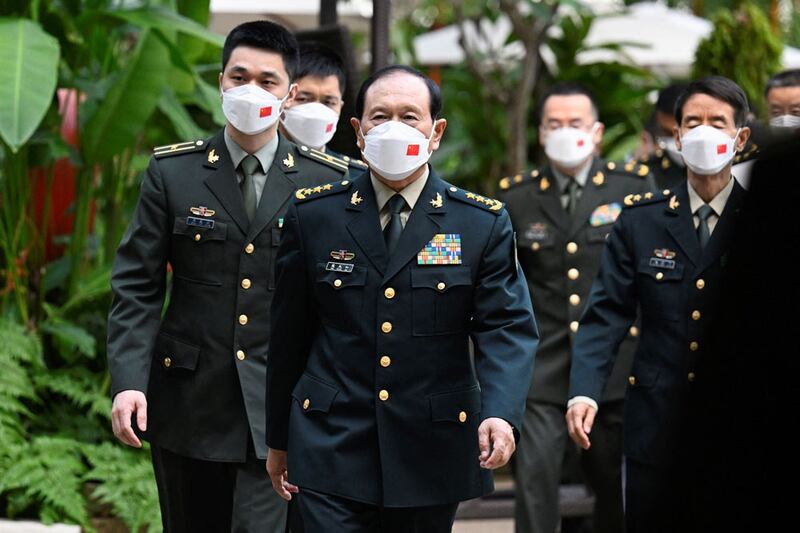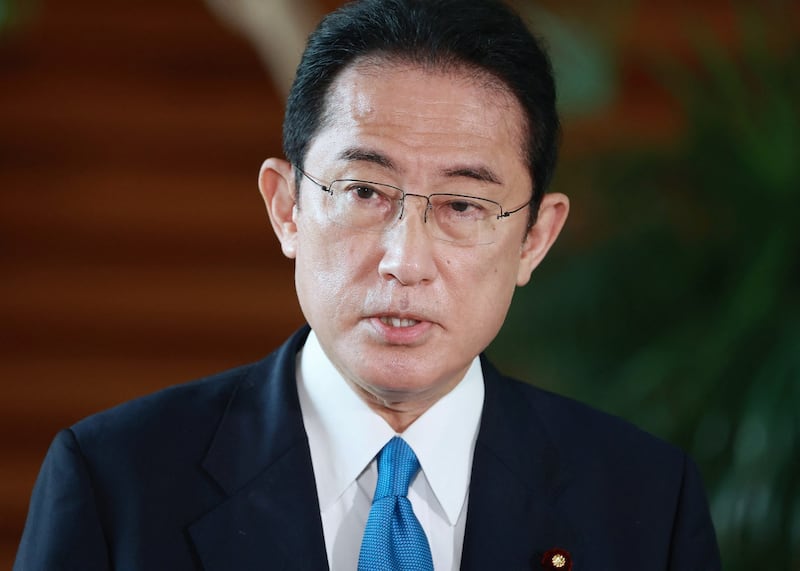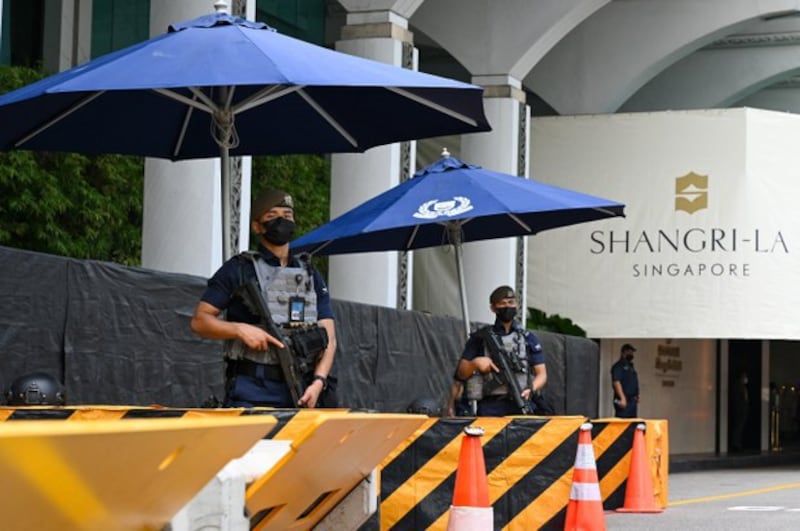UPDATED at 10:40 a.m. EDT on 2022-06-10
The defense chiefs of the United States and China held their first in-person meeting on Friday at the start of a regional security forum in Singapore where tensions between the two world powers are taking center stage.
U.S. Defense Secretary Lloyd Austin and his Chinese counterpart Wei Fenghe held their first face-to-face talks since Joe Biden became U.S. president 17 months ago. They met on the sidelines of the Shangri-La Dialogue, an annual gathering of top security officials and experts, the U.S. Department of Defense, or DoD, and dialogue participants said.
"Secretary Austin discussed the need to responsibly manage competition and maintain open lines of communication," the DoD said in a statement, adding that Austin "underscored the importance of the People's Liberation Army engaging in substantive dialogue on improving crisis communications and reducing strategic risk."
Bonnie Glaser, director of the Asia program at the German Marshall Fund of the United States, told RFA ahead of Friday’s meeting, that in April “Austin and Wei had a 45-minute phone conversation to present some talking points to each other but today they have a chance to express their concerns and bring the conversation beyond talking points.”
“My hope for an outcome of this meeting today is for the two sides to discuss various ways to prevent accidents from happening,” she said.
Since April's phone call, bilateral security ties between the U.S. and China have suffered more setbacks amid Beijing’s growing assertiveness and changing military postures in the region.
China has signed a security deal with the Solomon Islands and is setting up a naval facility in Cambodia. Both developments have raised concerns among the U.S. and its allies.
Chinese flyovers and naval patrols around Taiwan, in the East and South China Sea, are also posing challenges to the U.S. Indo-Pacific strategy. Austin on Friday called for China “to refrain from further destabilizing actions toward Taiwan.”
Washington has condemned what it calls “China’s provocations,” while Beijing has insisted it is the U.S. that threatens peace and security in the region.
The bilateral meeting in Singapore – “held at the Chinese side’s request,” according to the U.S. side – is not expected to deliver any major breakthroughs. However, it is expected to open a clearer and more regular communication channel between the two sides.
“In general, such dialogues remain rare in a bilateral relationship marked by scant human connections,” said James Crabtree, executive director of IISS-Asia – the Asia program of the London-based International Institute for Strategic Studies that hosts the Shangri-La Dialogue.
“This lack of communication would be cause for worry in any future regional crisis,” he said.

Preventing miscalculations
The U.S. defense secretary will speak at the dialogue on Saturday. The DoD says he’ll clarify the next steps for the U.S. Indo-Pacific strategy with emphasis on the new approach of “integrated deterrence,” where the U.S. aims to “harmonize both traditional and emerging defense capabilities and priorities, along with non-military tools of power, with partners and allies in support of a free and open Indo-Pacific.”
China’s Defense Minister Wei will speak on Sunday on China’s vision for regional order, in which “he will discuss China's policies, ideas and concrete actions in practicing true multilateralism, safeguarding regional peace and stability, and promoting the development of a community of a shared future for mankind,” according to Chinese state media.
Austin and Wei are holding various bilateral and multilateral meetings on the sidelines of the dialogue.
The U.S. defense secretary met with some ASEAN defense ministers including the Singaporean and the Vietnamese. On Saturday he’s scheduled to meet with South Korean Defense Minister Lee Jong-sup and take part in trilateral talks with Lee and their Japanese counterpart Nobuo Kishi before heading to Bangkok on Sunday.
The Chinese defense minister, meanwhile, is expected to meet the Japanese defense minister on Sunday to discuss North Korea. He co-chaired the inaugural Singapore-China Defense Ministers' Dialogue on Thursday afternoon.
Japanese media said Kishi wanted to register with Wei “Japan's concerns about China's growing maritime assertiveness, and to urge Beijing to exercise restraint.”

Kishida’s Vision for Peace
On Friday evening, Japanese Prime Minister Fumio Kishida gave a keynote address to kick off Shangri-La Dialogue 2022. He is the first Japanese prime minister to attend the dialogue since Shinzo Abe eight years ago.
Kishida outlined his vision for a free and open Indo-Pacific region to strengthen the rules-based international order. He promised to provide US$2 billion in assistance for Asia-Pacific nations for developing maritime security infrastructure over the next three years, while also investing in human resources.
Noting that the status quo "has already been changed by force” in the East and South China Seas, Kishida said Japan “firmly opposes such activities.”
“Many like-minded nations have shared their vision for a free and open Indo-Pacific,” the Japanese prime minister said, stressing that “collaboration with ASEAN on this is essential,” referring to the Association of Southeast Asian Nations.
Kishida called for efforts to "prevent a crisis similar to that in Ukraine from arising in the Indo-Pacific.” He stressed the importance of peace and stability across the Taiwan Strait.
“Ukraine today may be East Asia tomorrow,” he said.

Chinese state media earlier slammed the Japanese government’s foreign policy, saying that “Japan uses the pretext of ‘preventing a crisis like the Russia-Ukraine crisis from happening in Asia’ to legitimize its move to collude with NATO and to convince regional countries to serve its goal of targeting China.”
"Tokyo's selfish and dangerous attempt is unlikely to succeed," Chinese analysts were quoted as saying in the Chinese Communist Party's mouthpiece Global Times.
Chair of the NATO Military Committee Adm. Rob Bauer visited Japan this week and met with Defense Minister Kishi.
Bauer praised the “natural” partnership between NATO and Japan, saying the two sides “share the same values and challenges.”
Besides regional leaders, Ukrainian President Volodymyr Zelenskyy is expected to deliver a special address to Shangri-La Dialogue via video link on Saturday.
The dialogue, staged at a hotel in Singapore, has been held annually since 2002, but was suspended for the past two years due to the COVID pandemic.
This story has been updated with a quote from a U.S. statement on the U.S.-China meeting and with comments from the Japanese prime minister.
